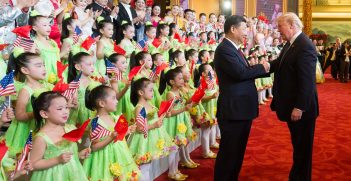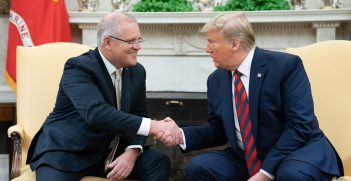Australian Foreign Policy: Not Quite a BBQ Stopper

In the lead up to the Australian federal election, there has been little discussion of the country’s international affairs. The norm of bipartisanship on foreign policy and the fact that it rarely features as a campaign issue unless the country is at war mean it is unlikely to have much of an impact on how people vote.
Pundits often ask why the public don’t take more time to get informed about politics. For academic political scientists, however, the question is really the wrong way around – it should really be framed, why DO people get informed about politics? More than 15 million people were registered to vote in the last Australian federal election – my vote is just a drop in the ocean in comparison. Rationally speaking, there’s little point in my taking an interest in politics. Even if the issues (such as education or housing) have a direct material impact on my wellbeing, taking time out from everything else in my life to get informed about them is really more a hobby than anything else. The same is even truer of foreign policy. Apart from the small proportion of Australians who serve in the Australian Defence Forces (ADF) and the Department of Foreign Affairs and Trade, foreign policy concerns are remote from the lives of most Australians. The debate in political science is really, therefore, about whether the public ever really cares about or is influential in foreign policy at all.
The answer to this question is that yes, foreign policy can matter in Australian electoral politics – but only under very restrictive circumstances, namely when Australia is at war. That’s why foreign policy was an important issue in the Federal Elections which took place during the Vietnam War, with both McMahon and Whitlam consulting carefully with pollsters in framing their policies towards the conflict and the course of the war strongly influencing both McMahon’s victory in 1966, and Whitlam’s in 1972. In spite of the ongoing commitment of the ADF to the conflicts in Afghanistan and against the Islamic State, the Australian public, for the most part, does not perceive Australia to be at war, and consequently, I do not believe that foreign policy will be an important issue for most voters in 2019. That doesn’t mean to say that the media won’t occasionally pay attention to foreign policy issues, but rather that very few voters will take them into account in deciding how to vote.
My friend and colleague Andrew Carr has made the interesting and provocative thesis that Australia should ditch the norm that foreign policy must be bipartisan. Andrew notes, correctly, that groups which allow a greater diversity of views will generally come to better decisions than groups which enforce conformity (provided, that is, that the members of the group come to their diverse opinions independently). Wouldn’t Australian foreign policy be better if the Coalition and Labor outlined more distinctive policies about, say, relations with the United States and China?
I am sympathetic to Andrew’s argument. But then I look at the United States.
Whatever the true nature of the ties between Russia and President Donald Trump, it is quite remarkable the degree to which the Republican Party have been willing to overlook and even cover up Russian interference in the 2016 presidential election. Although it was their own 2012 nominee Mitt Romney who described Russia as America’s number one geopolitical foe, only seven years later Republicans seem not to mind Russian interference provided it benefitted their party and hurt their opponents. Andrew has in mind I think the sort of high-minded strategic debate about ends and means you would see in a think tank or in a small circulation elite magazine such as Foreign Policy. Yet partisan foreign policy debate in the hands of politicians seeking office and a public with little incentive to think through the details could look quite different.
Let’s take relations with the United States and China, for instance. The United States and China have significant differences with respect to a number of important issues. Right now, Australia tends to be quite close to the American position, and far from the Chinese position, on most of these issues. The diplomatic position is that Australia “does not need to choose” between the United States and China, but the fact is that on these issues at least, Australia does need to choose whether to stick close to the United States or adopt a position closer to that of the People’s Republic of China. Suppose one of Australia’s main parties – most likely the Australian Labor Party – decided to opt to move away from the United States and towards China on a number of key issues. What would happen then?
Instead of promoting an illuminating debate about, say, extended deterrence and the geopolitics of the South China Sea, I think the US-China debate would end up becoming another culture war bun-fight about Australia’s identity along the lines of “Change the Date.” On the one hand, you would have a younger, multicultural, left-leaning, “our future is in Asia” tribe pushing for looser ties with Washington; and on the other, an older, more conservative, “Western civilization” tribe railing against the Chinese menace. The debate would rapidly become polarised and one’s position would be more a marker of political identity than the result of careful deliberation. To some extent, this is already happening. My research shows that support for the Australia, New Zealand and United States (ANZUS) alliance is significantly higher amongst older, more politically conservative Australians of Anglo-Celtic heritage and lower amongst Muslim and Asian Australians. Similarly, it is relatively easy to predict whether an individual Australian perceives China to be threatening if you also know whether they believe that Aboriginal land rights have gone too far or whether they think Australia should keep the monarchy. Making foreign policy issues such as relations with the United States and China partisan ones will simply make these differences much more acute and important. What’s even more troubling is that these tribal differences can be exploited by outside actors for their own benefit, as Russian efforts in the United States and elsewhere have already shown us.
In brief, foreign policy will be a marginal issue in 2019 since the general public does not perceive Australia to be at war. A norm of bipartisanship in foreign policy may serve to stifle debate, but it also prevents foreign policy from opening up divisions in Australian society similar to those which have hurt other countries.
Dr Charles Miller is a lecturer in Strategic Studies at the Australian National University. He is a PhD graduate in political science from Duke University. His research interests include public opinion and foreign policy, military effectiveness and far-right politics.
This article is published under a Creative Commons License and may be republished with attribution.





